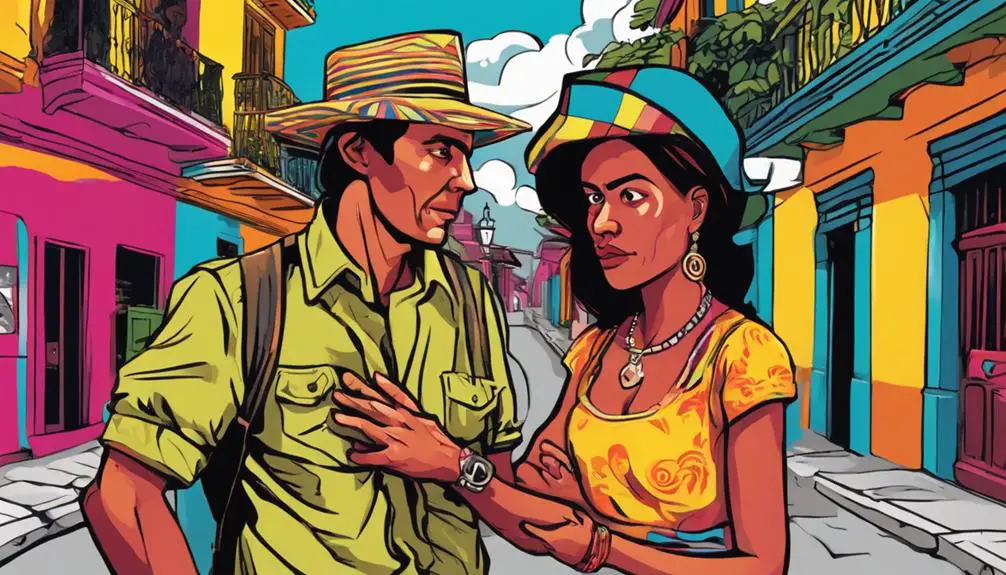When expressing jealousy in Spanish slang, you're tapping into the rich tapestry of Latin American and Spanish cultures. You'll discover regional nuances, like Argentina's emphasis on possessiveness or Mexico's fiery passion. European influences blend with African, indigenous, and Catholic heritages to shape unique expressions. As you explore these cultural intricacies, you'll uncover the intensity of emotions, machismo influences, and romantic undertones. From Colombia's multifaceted nature to Chile's possessive phrases, each region's slang conveys a distinct flavor of jealousy. As you continue to explore, the complexities of Spanish slang will reveal themselves, painting a vibrant portrait of human emotions.
Spanish Slang for Jealousy 101

Mastering Spanish slang for jealousy requires a thorough exploration into the nuances of Latin American and Spanish cultures, where subtle expressions and idiomatic phrases often convey complex emotions like envy and possessiveness. As you investigate into the world of Spanish slang, you'll discover that cultural influences play a significant role in shaping the language.
The origins of slang expressions can be traced back to historical events, social norms, and regional traditions. You'll find that Latin American and Spanish cultures have distinct approaches to expressing jealousy. In Latin America, for instance, African and indigenous influences have blended with European colonizers' languages, resulting in unique slang expressions.
In Spain, the Moorish occupation and Catholicism have left an imprint on the language, yielding distinct idiomatic phrases. Understanding these cultural influences is important to grasping the subtleties of Spanish slang for jealousy. By recognizing the cultural context in which slang emerges, you'll be better equipped to navigate the complexities of jealousy in Spanish conversations.
Regional Expressions in Latin America
As you explore the linguistic landscape of Latin America, you'll notice that regional expressions of jealousy vary greatly, reflecting the diverse cultural heritage of each country. Latin dialects, shaped by indigenous, African, and European influences, have given rise to unique cultural nuances that color the way people express jealousy.
| Country | Expression | Meaning |
|---|---|---|
| Argentina | Estoy celoso/a | I'm jealous (with a strong emphasis on possessiveness) |
| Mexico | Estoy echando chispas | I'm throwing sparks (implying a fiery passion and possessiveness) |
| Colombia | Me da coraje | It gives me anger/irritation (with a hint of jealousy) |
These regional expressions not only reflect the cultural nuances of each country but also provide a window into the complex emotions associated with jealousy. As you investigate further into the linguistic landscape of Latin America, you'll discover a rich tapestry of emotions, shaped by the region's complex history and cultural diversity.
European Flair for Jealous Feelings

You'll find that European languages have infused Latin American Spanish with a distinct flair for expressing jealous feelings, which has resulted in a unique blend of passion and possessiveness. This blend is evident in the way Spanish speakers express jealousy, often with a flair for the dramatic. The French passion for romantic love has influenced the Latin American concept of jealousy, making it a more intense and all-consuming emotion. This intensity is reflected in the language, with words like 'celos' (jealousy) and 'posesivo' (possessive) conveying a sense of urgency and desperation.
In contrast, the Spanish drama that permeates Latin American culture has added a layer of complexity to the expression of jealousy. It's not uncommon to see dramatic outbursts of jealousy in telenovelas or hear passionate arguments in everyday conversations. This cultural influence has created a language that's both expressive and intense, with jealousy being a common theme in daily life.
As you explore the nuances of jealousy in Spanish slang, you'll discover a rich tapestry of emotions, influenced by European languages and Latin American culture.
Grudge Holding in Mexican Slang
In Mexican slang, the concept of 'rencor' (grudge) is woven into everyday conversations, often manifesting as a lingering resentment that can simmer beneath the surface of interpersonal relationships. You may find yourself entangled in a web of Machismo resentment, where pride and ego fuel the fire of rivalry. Border rivalries, particularly between neighboring towns or cities, can also breed a sense of 'rencor' that's hard to shake off.
| Mexican Slang | English Translation |
|---|---|
| Rencor | Grudge |
| Envidia | Envy |
| Chango | Rival |
| Bronca | Resentment |
| Pique | Spite |
As you navigate the complexities of Mexican slang, you'll discover that 'rencor' can be a powerful motivator, driving individuals to prove themselves or seek revenge. However, it's essential to recognize the fine line between healthy competition and unhealthy obsession. By understanding the nuances of 'rencor' in Mexican culture, you'll be better equipped to build stronger relationships and avoid getting caught in the crossfire of Machismo resentment.
Colombian Ways of Saying Jealous

Your exploration of Latin American expressions of jealousy now shifts to Colombia, where the nuances of envy and resentment take on distinct forms. Here, you'll encounter a cultural landscape shaped by the Andean region's rich heritage and the Caribbean coast's vibrant rhythms.
In Medellín, the city of eternal spring, machismo culture reigns supreme, and jealousy is often masked as a display of masculine pride. You might hear phrases like 'estoy celoso' (I'm jealous) or 'me dio celos' (I got jealous), which convey a sense of possessiveness and ownership.
In Cartagena, the romantic old town, the concept of jealousy takes on a more whimsical tone. You might overhear locals whispering about having a 'crush' (enamoramiento) on someone, which can quickly escalate into a passionate, all-consuming jealousy. The coastal city's laid-back vibe belies the intensity of its people's emotions, where love and envy entwine like the ornate balconies that adorn its colonial architecture.
As you navigate Colombia's diverse regions, you'll uncover the complex, multifaceted nature of jealousy, where cultural nuances and linguistic expressions intertwine.
Argentinean Idioms for Envy
As you explore the Argentinean psyche, the idiomatic expressions of envy reveal a nation's fascination with grandeur and elegance, where the phrase 'me da envidia' (it gives me envy) captures the essence of aspirational longing. This phrase, often used to express admiration for someone's possessions or achievements, hints at the Argentinean obsession with luxury and refinement. You'll notice that envy triggers in Argentinean culture often stem from the desire for social status, material wealth, and sophistication.
Delving deeper, you'll discover that jealous roots in Argentinean society are deeply rooted in the country's historical and cultural context. The nation's complex past, marked by periods of economic boom and decline, has created a sense of insecurity and competition among its people. This has led to an environment where one's success is often measured by their ability to acquire wealth and status symbols.
As you navigate the intricacies of Argentinean slang, you'll find that understanding the nuances of envy and jealousy is essential to grasping the nation's psyche. By recognizing the subtle differences between 'me da envidia' and 'estoy celoso' (I'm jealous), you'll gain a deeper appreciation for the complexities of human emotion in Argentinean culture.
Costa Rican Phrases for the Green-Eyed

You'll find that Costa Rica's laid-back attitude belies a culture where envy and jealousy simmer beneath the surface, manifesting in unique phrases that capture the complexities of the green-eyed monster. As you explore the world of Tico phrases, you'll discover a fascinating blend of passion and possessiveness.
| Phrase | Translation | Context |
|---|---|---|
| Eres la reina de mi corazón | You're the queen of my heart | Expression of admiration and devotion |
| Me muero de celos | I'm dying of jealousy | Feeling overwhelmed by envy |
| Pura pasión | Pure passion | Intense emotional attachment |
In Costa Rican culture, Pura passion is more than just a phrase – it's a way of life. You'll find that even in casual conversations, Ticos express themselves with a fervor that's hard to ignore. Whether it's proclaiming undying love or confessing deep-seated insecurities, these phrases offer a glimpse into the complex tapestry of human emotions. As you investigate the nuances of Costa Rican slang, you'll uncover a world where passion and possessiveness blend in unexpected ways, revealing the intricate dance between love and jealousy.
Chilean Expressions of Possessiveness
In Chile, where the Andes meet the Pacific, a distinct cultural identity has spawned a unique lexicon that reflects a strong sense of ownership and territoriality.
You'll find that Chileans often use expressions that convey a sense of possessiveness, particularly in romantic relationships. For instance, the phrase 'mi media naranja' (my half orange) is a term of endearment that implies a sense of ownership and completeness.
This possessiveness is also reflected in the phrase 'mi pareja' (my partner), which emphasizes the idea that one's partner belongs to them. In the context of romantic rivalry, Chileans might use phrases like 'estoy celoso/a' (I'm jealous) or 'me da celos' (it gives me jealousy) to express feelings of possessiveness and insecurity.
Couple goals in Chile often involve a strong sense of partnership and mutual ownership, which can sometimes lead to romantic rivalry. By understanding these expressions of possessiveness, you'll gain insight into the complex dynamics of Chilean relationships.
Peruvian Slang for Insecurity

While maneuvering through the complexities of Peruvian relationships, you'll encounter a distinct slang that reveals the nuances of insecurity and jealousy, particularly in the domain of romantic relationships. In Peru, you'll find that the urban centers of Lima and Cusco have developed a unique lexicon to express these sentiments.
In Lima, anxieties surrounding relationships are often conveyed through the phrase 'estar en la luna de Valencia,' which literally translates to 'being on the moon of Valencia,' implying a state of emotional turmoil. Meanwhile, in Cusco, confessions of insecurity are often veiled in a subtle, enigmatic language, where partners might express doubts about their relationships using phrases like '¿Qué pasó?' or '¿Qué onda?' – both of which roughly translate to 'What's up?' or 'What's the vibe?' – subtly probing the emotional landscape of their partner.
As you navigate the intricacies of Peruvian relationships, understanding these colloquialisms will grant you insight into the country's rich cultural tapestry, where love, trust, and vulnerability are woven into a complex narrative of human connection.
Dominican Republic's Unique Twists
As you explore the linguistic landscape of the Dominican Republic, you'll uncover a rich tapestry of colloquialisms that reflect the nation's distinct cultural identity, particularly in the domain of romantic relationships. The Quisqueya Complex, a term coined to describe the unique blend of Taíno, African, and Spanish influences, permeates the language, imbuing it with a distinctive flavor.
In the domain of romantic relationships, the Dominican Republic's linguistic nuances take on a life of their own. The phrase 'estar jaloso' (to be jealous) is often replaced with 'estar celoso,' which carries a stronger connotation of possessiveness. This linguistic twist reflects the nation's deep-seated passion for love and relationships, aptly captured in the sensual rhythms of Bachata Passion, a genre born in the Dominican Republic.
As you delve deeper into the language, you'll discover a complex web of emotions, where 'estar enamorado' (to be in love) is often tempered by a healthy dose of jealousy, revealing the intricate dance between love, possession, and passion that defines the Dominican Republic's romantic psyche.
Frequently Asked Questions
Can You Use Spanish Slang in Formal Writing or Professional Settings?
When you're writing in formal or professional settings, you'll generally want to maintain a formal tone and avoid using slang or colloquial language.
While Spanish slang can add flavor to casual conversations, it's not typically suitable for professional or academic writing.
You'll want to opt for standard, professional language that conveys your message clearly and respectfully.
This guarantees your writing is taken seriously and resonates with your intended audience.
Are There Regional Differences in Spanish Slang for Jealousy?
As you explore regional differences in Spanish slang, you'll find that each country has its unique flavor.
In Colombia, the dialect is characterized by voseo, using 'vos' instead of 'tú.'
In Argentina, phrases like '¿Quién es ese tipo?' (Who's that guy?) convey a sense of jealousy.
Mexico's idioms, such as 'Estar celoso' (to be jealous), are more direct.
Chilean expressions, like 'Estar verde' (to be green with envy), are colorful.
Peruvian vocabulary, like 'Celosía' (jealousy), is more formal.
Can I Use European Spanish Expressions in Latin America?
As you navigate the complexities of Spanish language and culture, you're wise to contemplate the implications of using European Spanish expressions in Latin America. While Latin Americanization has led to increased cultural exchange, language barriers, and regional identity still pose challenges.
You must balance your desire to connect with Spanish heritage against the risk of cultural insensitivity. Be mindful of local nuances and adapt your language accordingly to foster meaningful connections.
Are There Non-Verbal Cues for Jealousy in Spanish-Speaking Cultures?
As you navigate the complex dance of relationships in Spanish-speaking cultures, you wonder: are there non-verbal cues for jealousy?
Imagine a subtle tightening of the jaw, a fleeting glance – the green-eyed monster rears its head.
Yes, body language and micro-expressions can betray the emotions you try to conceal. A raised eyebrow, a pursed lip, or a tense posture can signal the onset of jealousy, even if the words remain unspoken.
Attune yourself to these subtle cues to uncover the emotions that lie beneath the surface.
Can You Teach Children Spanish Slang for Jealousy or Is It Inappropriate?
When teaching children Spanish, you'll encounter nuanced emotions like jealousy. As a responsible educator, you must ponder if it's crucial to introduce slang for this complex feeling.
It's vital to take into account kids' emotions and parental guidance. Start by acknowledging that jealousy is a natural emotion, then provide context and explanations to help them understand its implications.
With careful planning, you can create a safe space for kids to explore and express their emotions in Spanish.
Conclusion
As you navigate the nuances of Spanish slang for jealousy, remember that cultural context is key. Don't be caught off guard by regional expressions that can make or break relationships.
From Mexico's 'tener malas intenciones' to Chile's 'estar celoso,' each phrase is a thread in the rich tapestry of Latin American culture.
So, don't let jealousy get the best of you – take the reins and 'seguir adelante' (move forward) with a deeper understanding of the language of love and possession.







